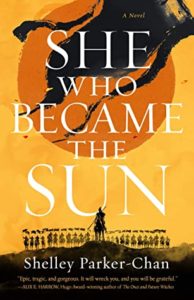
Sometimes there’s a book that comes out to such acclaim that I feel like I don’t have to rush to read it, because it’s bound to appear on my Hugo reading list. In 2021, no book fit that mold better than Shelley Parker-Chan’s historical fantasy debut She Who Became the Sun. I didn’t read it at the time, but sure enough, it’s a Hugo Finalist for Best Novel, and it has ascended my TBR accordingly.
She Who Became the Sun is a reimagining of Chinese history with a mild fantasy spin—I don’t know enough about Chinese history to tell you exactly which part, and I’ve intentionally not researched, in hopes that my ignorance would help the story feel fresh—and features a pair of perspective characters. The lead, Zhu Chongba, grows up a peasant girl in a family always on the verge of starvation but who possesses a single-minded determination to achieve greatness, even if it means leaving her identity behind and masquerading as her older brother. And then there’s General Ouyang, who might not quite reach co-lead status but gets plenty of page time. His entire family was executed by Mongol invaders, and he preserved his life only by choosing castration and a life of servitude, a life that saw him progress through the military until he commanded significant Mongolian forces against the rebellious natives to the South.
She Who Became the Sun is not a perfect book, but it does pretty much exactly what I hope for in an epic fantasy series-opener. It presents compelling characters and stakes and delivers a story that justifies its value as a single book, even while setting up further action to be pursued in the sequel. It’s a much easier read than I expected from a lengthy historical fantasy and avoids getting bogged down with too many details.
In may be in fact that it too assiduously avoids getting bogged down in details, with significant time jumps that send us rocketing out of Zhu’s childhood and into the period of the main action, plus frequent cuts away from details of political maneuvering or military action, eschewed in favor of character fallout. These lost details do force the politics and coming-of-age to the shallow end of the spectrum, but it’s more than counterbalanced by the sheer depth and power of the character work. Both Zhu and Ouyang come to life, even when it’s difficult to sympathize with their goals—with Ouyang’s complicated impulse for vengeance hitting a bit more naturally than Zhu’s raw thirst for greatness. Zhu’s life as a woman masquerading as male in a patriarchal society and Ouyang’s life as a eunuch preventing him from fitting naturally in either male or female roles make for fascinating exploration of gender experience, and their grappling with fate provides more than enough momentum for the central plot.
Which brings us to the speculative elements. Light though they may be, they represent some of the more confusing elements of the story. There are certainly ghosts—though it’s not clear quite how much they affect the world of the living—and there is a mandate of approval from heaven that manifests in flame. But Zhu seems to view heaven as powerful enough to deliver her greatness but weak enough to be tricked by a change of outfit and strict avoidance of the attitudes and actions of a woman. But if the supernatural is difficult to understand, it certainly should be no surprise when cultural beliefs about it are contradictory. So while Zhu’s fate-obsession may feel less natural for Western readers, that probably comes more from cultural distance than any deficiency in the storytelling.
Overall, the focus on the two main perspective characters gives short shrift to politics and magic, but the characters are absolutely good enough to carry the book on their own. Add some hard-hitting plot arcs that give the first book a feeling of completion even with work still to be done and a couple absolutely fabulous side characters—who I haven’t even mentioned yet, but who I sincerely hope see increased page time in the sequel—and She Who Became the Sun hits just the right notes for a series-opener.
Recommended if you like: power fantasy, exploration of gender, antiheroes.
Can I use it for Bingo? It’s hard mode for Historical SFF and Revolutions or Rebellions, and it’s also a Book Club book with an Anti-Hero and a BIPOC Author where Family Matters.
Overall rating: 17 of Tar Vol’s 20. Five stars on Goodreads.
